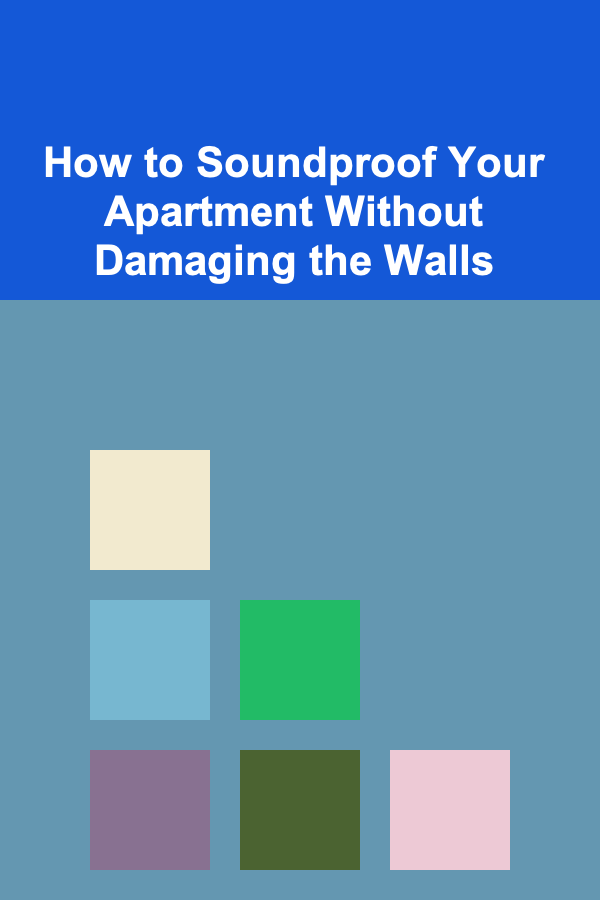
How to Soundproof Your Apartment Without Damaging the Walls
ebook include PDF & Audio bundle (Micro Guide)
$12.99$8.99
Limited Time Offer! Order within the next:

Living in an apartment offers many benefits---convenience, access to urban amenities, and often, a sense of community. However, one downside is the noise. Whether it's the sounds of neighbors walking, talking, or listening to music, or street noise creeping through the windows, unwanted noise can disrupt your peace and quiet. Soundproofing is often the most effective way to tackle this issue, but many renters and apartment dwellers face the challenge of not being able to make permanent alterations to the space. Fortunately, there are several ways to soundproof your apartment without damaging the walls or violating your lease agreement. This guide explores these methods, offering practical solutions for creating a quieter living space.
Understanding the Basics of Soundproofing
Before diving into specific solutions, it's important to understand the basics of soundproofing. Soundproofing is the process of reducing the amount of sound that travels from one room to another or from outside into your home. Sound can be categorized into two main types:
1. Airborne Sound
Airborne sound travels through the air, such as voices, music, or street noise. This type of sound can easily penetrate walls, ceilings, and floors. Airborne sound typically requires a barrier or insulation to block it.
2. Impact or Structure-Borne Sound
Impact sound is caused by physical vibrations, such as footsteps, furniture being moved, or a washing machine running. This type of sound travels through solid surfaces, including floors and walls.
Both types of sound can be a nuisance in an apartment setting. By understanding the source of the noise, you can choose the appropriate methods to tackle it. Below are several strategies for soundproofing an apartment without permanently altering or damaging the walls.
Sealing Gaps and Cracks
Even the smallest gaps or cracks can allow noise to travel between rooms. Therefore, the first step in soundproofing your apartment is to seal these openings. Common areas that need attention include:
- Around windows and doors: Gaps around the frame of windows and doors are prime spots for sound leakage.
- Electrical outlets: These can sometimes have tiny gaps through which noise can travel.
- Baseboards and corners: Small cracks along the baseboards or where the walls meet the floor can also contribute to sound leakage.
Sealing Solutions
- Weatherstripping: One of the easiest and most cost-effective ways to seal gaps is by using weatherstripping around doors and windows. This material is typically self-adhesive and can be applied to the edges of windows and doors to prevent sound from seeping through.
- Acoustic Caulk: For gaps or cracks in walls, use acoustic caulk. This type of caulk is specially designed to block sound, creating an effective seal without damaging the walls when removed. You can apply it to cracks, around windows, or at the edges of doors.
- Door Sweeps: Install a door sweep at the bottom of your door to block noise from entering or leaving the room. These are available in various styles and can be easily attached to the door.
Why This Works
Sealing gaps helps reduce the amount of airborne sound that passes through these openings. It's a simple and non-invasive way to prevent sound from slipping into your apartment through common access points. When applied correctly, weatherstripping and caulk can make a noticeable difference in the reduction of noise.
Using Soft Furnishings to Absorb Sound
Another effective way to soundproof an apartment without damaging the walls is by using soft furnishings to absorb sound. Soft materials, such as fabrics, rugs, and upholstered furniture, can absorb sound waves, reducing the amount of noise that bounces around your apartment.
Key Items to Consider:
- Thick Curtains: Heavy, thick curtains or drapes can act as a barrier to airborne sound, especially when hung over windows. Look for curtains specifically designed for soundproofing or those made from dense materials like velvet or polyester.
- Rugs and Carpets: Wooden and tile floors can amplify sound by allowing it to travel easily through the floor. Placing large, thick rugs or carpets on the floors will help absorb both airborne and impact sounds. If you're on a higher floor, this also reduces noise for your neighbors below.
- Upholstered Furniture: Sofa cushions, armchairs, and any other padded furniture absorb sound. Adding soft furniture to your apartment will help reduce sound reverberation, especially in open-plan spaces.
- Acoustic Panels: If you're dealing with a lot of reverberation or echoing sounds, consider adding sound-absorbing panels to your walls. Many acoustic panels come in attractive designs and can be mounted without causing damage. These panels are effective at reducing the sound that bounces off hard surfaces like walls, windows, and ceilings.
Why This Works
Soft materials like carpets, curtains, and upholstery absorb sound rather than reflecting it. By creating these buffers throughout your apartment, you can significantly reduce the amount of noise that travels from room to room. In particular, rugs and curtains will help block some of the external noise, such as traffic, while also minimizing internal noise between rooms.
Soundproofing the Floors
Floor noise can be a major issue in apartments, particularly if you live on the lower floors or have noisy neighbors above. Impact sounds from footsteps, furniture scraping, or children playing can be quite disruptive. Fortunately, there are several ways to soundproof the floors without making permanent changes.
Solutions for Soundproofing Floors
- Rubber Floor Mats or Rugs: If you're looking for a temporary, non-invasive solution, consider using rubber mats or large area rugs. Rubber mats are excellent at absorbing impact sound, and they can be easily removed when you move out. Combine them with thick area rugs to reduce the noise further.
- Foam Underlayments: Foam underlayments are often used beneath carpets to absorb sound and reduce impact noise. These materials are available in various densities, with thicker varieties offering better soundproofing properties. If you're using a carpet or rug, placing a foam underlayment underneath can help dampen vibrations caused by footsteps or other impacts.
- Cork Flooring: If you're planning to upgrade your flooring without damaging the apartment, cork is an excellent option. Cork is naturally sound-absorbing and can help reduce both airborne and impact noise. It's easy to install as a floating floor, which means you won't need to permanently alter the existing floor.
Why This Works
The floor is often a major culprit when it comes to noise transfer. Using rubber mats or foam underlayments helps minimize vibrations from traveling through the floor and into adjacent rooms. This is especially beneficial in apartments with noisy neighbors or if you live on a higher floor and want to avoid disturbing those below you.
Soundproofing Windows
Windows are another major source of sound leakage in apartments. Street noise, traffic, or nearby construction can often be heard through windows, especially if they are single-glazed or old. There are a few solutions you can use to soundproof windows without making permanent changes.
Solutions for Soundproofing Windows
- Window Inserts: Window inserts are a great way to reduce external noise without replacing your windows. These are acrylic or glass panes that fit snugly inside your existing window frames. They create an additional air barrier that blocks sound and can be removed without leaving any permanent damage.
- Heavy Drapes: Thick, heavy drapes not only block light but also help reduce the amount of noise that comes through the windows. Look for drapes specifically designed for soundproofing, which are made from thick, sound-dampening materials.
- Soundproof Window Film: This adhesive film is applied directly to your windows and helps dampen sound. It is less intrusive than window inserts and can be easily removed when you move out.
Why This Works
Windows are a common source of sound leakage, especially in older apartments or those located on busy streets. Installing window inserts or using thick drapes adds an extra layer of protection, helping to block noise from entering through the windows.
Soundproofing the Ceiling
If you live in a building with noisy neighbors above you, ceiling soundproofing becomes crucial. Impact noises such as footsteps, furniture movements, or dropped objects can travel through the ceiling. While it can be more challenging to soundproof a ceiling without major alterations, there are still a few ways to reduce noise.
Solutions for Ceiling Soundproofing
- Acoustic Foam Panels: Installing acoustic foam panels on your ceiling is a non-invasive method of reducing sound. These panels absorb sound waves, preventing them from traveling through the ceiling and into your living space.
- Ceiling Baffles: Ceiling baffles are large, absorbent panels that hang from the ceiling. These are effective for controlling echo and reducing the amount of noise that reverberates from upper floors. They can be suspended from the ceiling and removed without causing damage.
- Adding Insulation: If you're allowed to make minor modifications to the ceiling, adding soundproofing insulation between the ceiling and floor above can help reduce noise. Insulation materials like fiberglass or mineral wool help absorb sound and reduce noise transmission.
Why This Works
The ceiling is a key area for impact sound to travel through, especially in multi-story apartments. By using foam panels or adding insulation, you can create a barrier that absorbs sound and prevents it from entering your living space.
Creating White Noise
Sometimes, the most effective way to deal with unwanted noise is to mask it with something else. White noise machines or fans can create a consistent background sound that helps mask intrusive noises. This can be particularly helpful when external noise is unavoidable.
Solutions for Creating White Noise
- White Noise Machines: These machines generate a steady stream of background noise that can mask other sounds, such as traffic, neighbors, or street noise. They are portable and can be placed in any room of your apartment.
- Fans or Air Purifiers: Using a fan or air purifier can also help create white noise. These devices provide a consistent hum that can help drown out background sounds.
Why This Works
White noise works by filling the space with a consistent sound that distracts your brain from focusing on unwanted noises. It's an easy and effective way to reduce the perception of noise, particularly if the source of the noise is unavoidable.
Conclusion
Soundproofing an apartment can be a challenging but rewarding task. Whether you're dealing with noisy neighbors, street traffic, or the echoes within your own space, there are numerous ways to soundproof your apartment without damaging the walls or violating your lease agreement. From sealing gaps and adding soft furnishings to installing window inserts and acoustic panels, these methods allow you to create a quieter, more peaceful environment. With these strategies, you can transform your apartment into a soundproof sanctuary, reducing the amount of noise that disrupts your daily life.

How to Add a Touch of Luxury to Your Home Renovation
Read More
How to Choose a Home Security Company That Fits Your Needs
Read More
How to Make Your Home Safe for Small Pets like Hamsters and Rabbits
Read More
How To Sketch Your Favorite Fictional Characters
Read More
How to Start Utilizing Online Marketplaces for Selling Unused Items
Read More
How To Understand Software Design Patterns
Read MoreOther Products

How to Add a Touch of Luxury to Your Home Renovation
Read More
How to Choose a Home Security Company That Fits Your Needs
Read More
How to Make Your Home Safe for Small Pets like Hamsters and Rabbits
Read More
How To Sketch Your Favorite Fictional Characters
Read More
How to Start Utilizing Online Marketplaces for Selling Unused Items
Read More